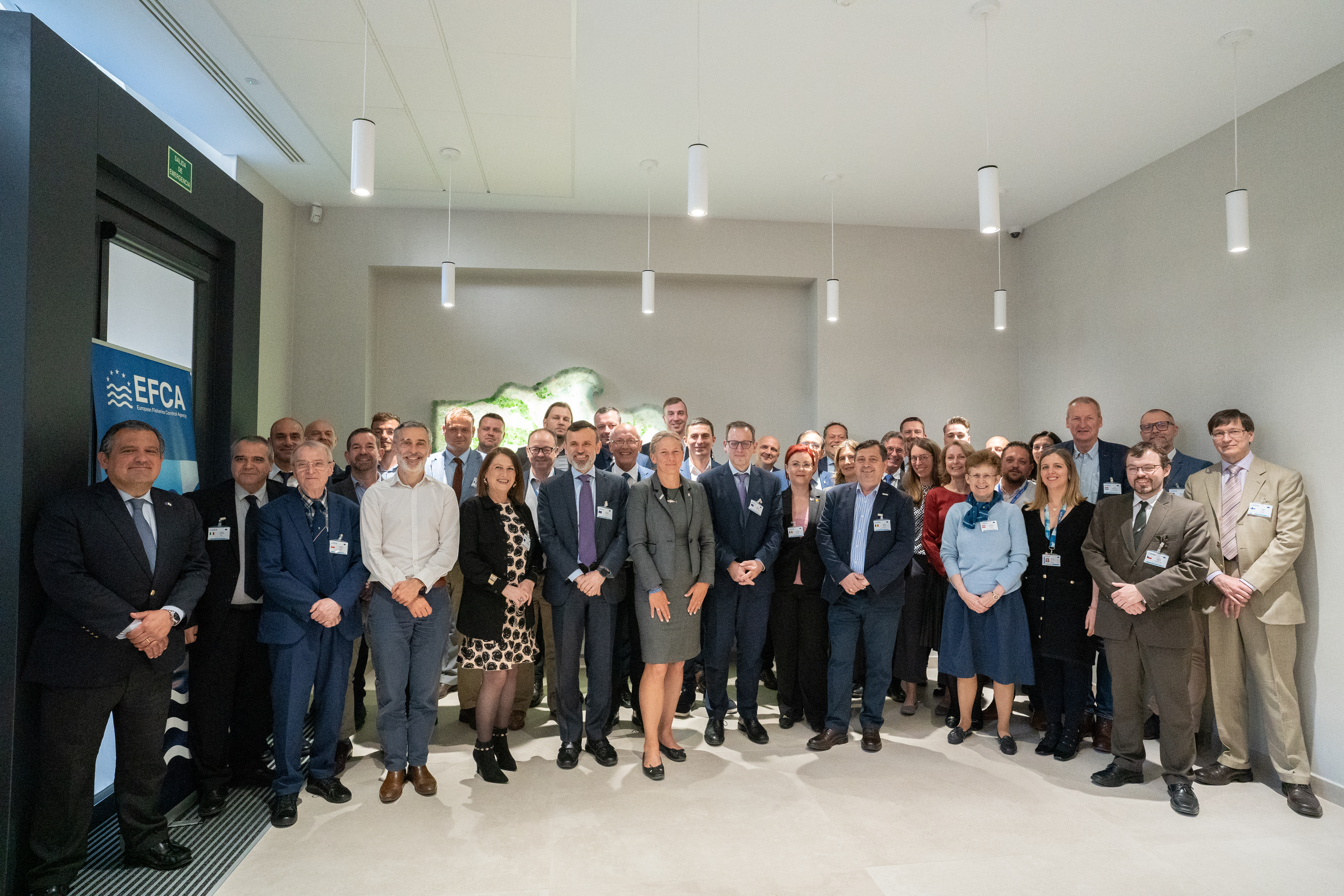During its meeting held in Vigo, EFCA Administrative Board adopted the Annual Report reflecting all the activities undertaken by the EFCA last year.
Throughout 2023, EFCA has continued to grow in its key role in the operational coordination of fisheries control in the European Union. Coordinating six Joint Deployment Plans (JDPs), the Agency has enhanced collaboration among national control and inspection authorities. The operational endeavours of EFCA are underpinned by the dedication of Member States and their collective deployment of national inspectors via JDPs. It was the first year that the Agency deployed together three Offshore Patrol Vessels (OPVs), the Ocean Sentinel, the Ocean Protector and the Ocean Guardian, adding fundamental fisheries control capacity to the European Union. EFCA’s information systems enabled the efficiency and the effectiveness of the coordinated control operations.
These were the main highlights:
- In 2023, the cooperative efforts resulted in 44993 coordinated inspections reported within the JDPs framework, 4230 of which led to the identification at least one suspected infringement.
- The EFCA working group on Remote Electronic Monitoring (REM) was active during 2023 on the exchange of experiences and best practices from the implementation of REM pilot projects and on the preparation for the future mandatory implementation of REM following the new Fisheries Control Regulation (EU) 2023/2842.
- In the international dimension of the CFP, EFCA continued to assist the Commission in the cooperation with third countries and international organisations dealing with fisheries such as Regional Fisheries Management Organisations (RFMOs) (namely, NAFO, NEAFC, ICCAT and GFCM), to strengthen operational coordination and compliance.
- In the fight against IUU activities, EFCA assisted the European Commission with the analysis of catch certificates and processing statements from four third countries and provided technical support during five evaluation missions to third countries.
- By concluding the project PESCAO at the end of 2023, EFCA contributed to the achievement of its overall objective, to enhance the contribution of fisheries resources to sustainable development, food security and poverty alleviation in West Africa. EFCA provided technical support to the Sub-Regional Fisheries Commission, the Fisheries Committee for the Western Central Gulf of Guinea and their member countries, in a coordinated manner, using its experience in the EU context.
- In the context of the European Coast Guard cooperation, between EFCA, Frontex and EMSA, for the first time EFCA led Multipurpose Maritime Operation (MMO) Adria 2023. EFCA continued the implementation of a dedicated project allocated by the European Commission to update and make publicly available the Practical Handbook on European Cooperation on Coast Guard Functions, including ensuring European Coast Guard Functions Academies Network Project (ECGFA-Net) is followed up, and the implementation of an EU Coast Guard portal.
- EFCA continued the implementation of the Project ‘Analysis for the weighing process of fishery products in the Member States and strategy’, which aims to provide an up-to date overview of the measures and procedures in place in representative fisheries of the European Union (EU) regarding the weighing of fishery products across the six European sea basins (i.e., the Mediterranean Sea, the North Western Waters, South Western Waters, North Sea, Baltic Sea, and Black Sea).
EFCA continued the implementation of two projects in the West Mediterranean area supporting Third Countries in the improvement of compliance with the rules adopted in GFCM and ICCAT:
- A project (e-fish Med) dedicated to providing training and training material in fisheries control to five African countries in North Africa.
- A project dedicated to support the monitoring of fishing activity for Algeria
- A total of 2433 officials (684 from EU Member States, 315 from Third Countries, and 1448 registered active users in EFCA e-learning platform) were trained;
- Chartering of three seaborne inspection platforms and one airplane marked a turning point and materialised EFCA’s commitment to support Member States authorities and the European Commission through the promotion of compliance with the fisheries rules, and the contribution to the safety, security and sustainability of seas, demonstrating concrete results in this regard.
- In 2023, EFCA further increased the use of satellite imagery and vessel detection technologies, using the EMSA Copernicus Maritime Surveillance (CMS) service under the EFCA-EMSA SLA. EFCA’s information systems enabled the collection of data from each Member State on fishing vessels, catches and other information.
"I extend my profound appreciation to all entities and collaborators who have played a part in the achievements of the European Fisheries Control Agency. Their backing has empowered the Agency to fulfil its goals and execute its agenda for 2023. Our joint endeavours have led to a more uniform and efficient application of the Common Fisheries, fostering fair competition, preserving biodiversity, and securing a future for the industry," said Susan Steele, EFCA Executive Director.

Background
EFCA is a European Union agency that promotes the highest common standards for the control, inspection and surveillance under the Common Fisheries Policy (CFP). EFCA was established to organise operational coordination activities by the Member States and to assist them to cooperate so as to comply with the CFP rules in order to ensure its effective and uniform application.
The added value of the work of the agency lies in its contribution to sustainable fisheries by enhancing compliance with conservation and management measures and to a European-wide level playing field for the fishing industry.
The Administrative Board is the governing and controlling body of EFCA. It is composed of six representatives of the European Commission and one representative per Member State. The Administrative Board holds a meeting at least once a year.

